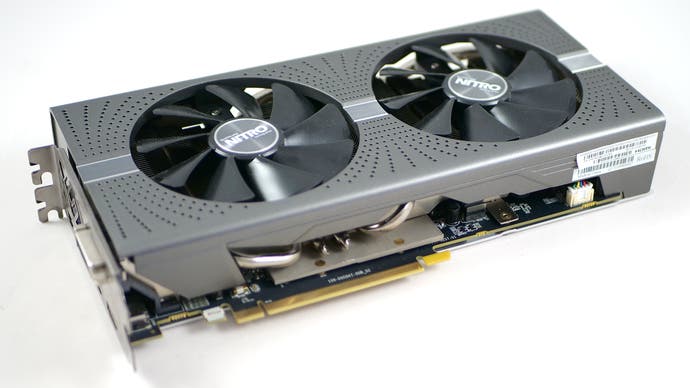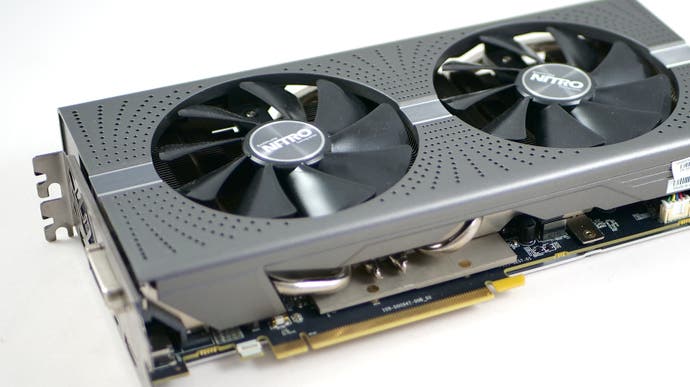AMD Radeon RX 580 benchmarks: the Red Team's 1080p contender
Taking the fight to Nvidia's GTX 1060.
The AMD Radeon RX 580 is one of the best graphics cards for PC gaming right now, thanks to its excellent 1080p gaming performance and low price point. Compared to the more popular GTX 1060 6GB, it is more often than not both faster and less expensive. However, the GTX 1060 remains the most popular graphics card reported by Steam users, with the RX 580 not even getting a look in - a true tragedy.
In theory, the RX 580 should be able to hit 60 frames per second in most games at 1080p, making it a good option for getting console-quality graphics, or better, at double the frame-rate. To see how well theory lives up to reality, we'll show you gaming benchmark results for ten different games, pitting the RX 580 against its closest mid-range competitors: the new (and more powerful) RX 590 and the best-selling GTX 1060 6GB. We'll also compare the RX 580 to its AMD Radeon antecedents and descendants, including the Fury X, Vega 56 and Vega 64, towards the end of the article.
Which GPUs are worth buying? We've made our picks for the best graphics cards available, updated with the latest graphics cards as they're released. As well as an overall performance champ, we name the best value graphics card and best cheap graphics card to guide your next upgrade.
It's worth mentioning that there are no AMD-made reference models available for the RX 580 or RX 590, just partner boards that come with an assortment of out-of-the-box clock speeds. To get comparable results, especially with the reference GTX 1060, we've set our Radeon cards to their reference specifications in AMD's Wattman software. That means that some RX 580 and RX 590 cards may offer better performance than is reflected here, in the region of three to seven per cent, with otherwise equivalent hardware.

| GPU cores | Boost clock | TFLOPS | Memory | Memory Bandwidth | |
|---|---|---|---|---|---|
| RX 580 | 2304 | 1340MHz | 6.2 | 4GB/8GB | 256GB/s |
| RX 590 | 2304 | 1545MHz | 7.1 | 8GB | 256GB/s |
| GTX 1060 | 1152/1280 | 1708MHz | 3.9/4.4 | 3GB/6GB | 192GB/s |
For each benchmark, you'll see a YouTube video within a bespoke benchmark system unless you're viewing this page on mobile. Start the video by pressing the play button, and you'll see how each card handles the scene in real time. You can use the controls on the right to add or remove graphics cards from the comparison, as well as see how different cards perform at different resolutions.
Below the live graph, you can see the average results from the entire run, including the average frame-rate and the (often useful) worst one per cent and worst five per cent figures. You can click on the barchart to toggle between absolute and relative frame-rate values too.
You can learn more about how these benchmarks work and why we developed the system this way in our guide to the new Digital Foundry benchmarking system.
Now that we've gotten that out of the way, let's get right into the results!
Assassin's Creed Odyssey
The most recent Assassin's Creed release, Odyssey, offers a punishing benchmark at its ultra high preset. The RX 580 manages to just about rumble through with a 36fps result, with the RX 590 and GTX 1060 providing successively higher frame-rates. Realistically, the high or medium presets would offer a significantly better gameplay experience, especially if you're tempted to run the game at 1440p or ultra-wide resolutions.
AC Odyssey: Ultra High
Assassin's Creed Unity
Assassin's Creed Unity remains a mainstay of our benchmarks five years after the game first debuted, thanks to the challenge it still provides to modern mainstream GPUs - and particularly those from Team Red. The RX 580 doesn't quite manage to exceed 60fps even at 1080p, with the extra horsepower of the RX 590 and Nvidia's architectural differences in the GTX 1060 allowing both other cards to manage the same feat. The 1440p results show a broadly playable game even on the RX 580, as long as you're able to accept console-quality frame-rates or turning down some graphics settings.
AC Unity: Ultra High, FXAA
Battlefield 1
While the Assassin's Creed AnvilNext engine isn't kind to AMD hardware - as we saw in the past couple of benchmarks - the Frostbite engine that powers Battlefield titles is a different story. 2016 release Battlefield 1 shows this best, with the RX 580 coming out with a narrow four per cent lead over the GTX 1060. Tellingly, the GTX 1060 manages higher frame-rates in stable sections of the no man's land gameplay section we used to test the cards, but drops far lower in response to nearby explosions and other challenging scenes. That provides AMD users with a substantially more stable experience, which we'd argue is more important than the slim advantage the RX 580 shows in average frame-rates.
Battlefield 1: Ultra, TAA
Crysis 3
Crysis remains synonymous with PC gaming performance, so including 2013's Crysis 3 in our benchmark suite is a no-brainer. The rail-shooter section we've benchmarked shows very similar performance between the GTX 1060 and RX 580 at 1080p, although the Nvidia card pulls out a small advantage at higher resolutions. Once again, the GeForce hardware shows greater frame-time variation, higher highs and lower lows, while the Radeon card remains relatively stable. The RX 590 remains the performance champ of the three, with an eight to ten per cent lead over its little brother regardless of resolution.
Crysis 3: very high, SMAA T2X
Far Cry 5
The most recent Far Cry release, Far Cry 5, is surprisingly easy on mainstream graphics cards at 1080p. All three cards in our comparison manage healthy frame-rates between 70 and 82 frames per second, with the GTX 1060 at the rear, the RX 580 slightly ahead and the RX 590 with the most commanding lead. That suggests adopting a more mid-range preset could allow you to take advantage of a high refresh rate 1080p144Hz monitor, which is exciting for a game released in 2018. 1440p also works well enough, with the RX 580 scoring eight per cent better than the GTX 1060. The game is even a few settings tweaks away from hitting 4K/30fps on the RX 580, although I'd be tempted to run the game at 1440p even on a higher-res monitor.
Far Cry 5: Ultra, TAA
Ghost Recon Wildlands
Another recent Ubisoft release, Ghost Recon Wildlands is the most demanding benchmark in our suite thanks to its brutal ultra graphical preset. We'd recommend using very high or high for actual gameplay, but ultra lets us see how these mid-range cards perform when pushed to the absolute limit. The RX 580 is the slowest of the three cards at 1080p, scoring just 38fps, but it draws level with the GTX 1060 at 1440p (30fps) and 4K (18fps).
Ghost Recon Wildlands: Ultra, TAA
Rise of the Tomb Raider
The Rise of the Tomb Raider is the middle child in the series, with a three-part benchmark that isn't necessarily representative of actual gameplay - it's actually easier to run than the full game. However, it's still a good way to see how the Foundation Engine of 2016 is handled by these three cards, and gives additional context for the Shadow of the Tomb Raider results we'll look at later. In Rise, the RX 580 and GTX 1060 are near-identical at 1080p, with scores around 82fps, while the RX 590 remains around 10 per cent ahead. The benchmark is also playable at 1440p, although as we mentioned, the full game might necessitate a few settings tweaks to attain the same average frame-rate.
Rise of the Tomb Raider: Very High, SMAA
Shadow of the Tomb Raider
2018 title Shadow of the Tomb Raider is a better simulation of real gameplay, but also offers a sterner test for our three mainstream GPUs. The GTX 1060 shows the most interesting results here, tanking hard even at 1080p for an average frame-rate of just 56fps. The RX 580 and RX 590 avoid this fate and deliver much smoother frame times, with average frame-rates of 62fps and 68fps, respectively. 1440p is also just about playable on all three cards, with frame-rate averages of 40fps achievable without any settings tweaks.
Shadow of the Tomb Raider DX12: Highest, TAA
The Witcher 3
Modern classic The Witcher 3 isn't likely to be replaced in our benchmark suite until the release of Cyberpunk 2077 in just 58 years, so let's take a look at the results as we convince Roach to take us on a tour of the Novigrad city streets. The game plays better on AMD hardware (as long as Nvidia Hairworks is disabled), with the GTX 1060's respectable 66fps result at 1080p being blown out of the water by the RX 580's 74fps and the RX 590's 82fps. That's one of the biggest differentials we've seen, and it's maintained across the 1440p and 4K results as well.
The Witcher 3: Ultra, POST-AA, No Hairworks
Wolfenstein 2: The New Colossus
One of the latest additions to our benchmarks is Wolfenstein 2: The New Colossus. In this test of the game's New Orleans level, the RX 580 is able to muster 95 frames per second; enough to make meaningful use of a high refresh rate monitor. That's a mighty 15 per cent ahead of the GTX 1060, which struggles in Vulkan titles, but still nine per cent behind the more powerful RX 590. The game remains highly playable at 1440p on AMD hardware too, with both cards above 60fps average.
Wolfenstein 2 Vulkan: Uber, TSSAA 8x
Generational comparison
Finally, we'll look at how the RX 580 compares to its AMD stablemates in the Assassin's Creed Unity benchmark. The RX590 remains behind the R9 Fury X and AMD's Vega cards, including the Radeon 7, but still offers a significant lead over the RX 570.
Assassin's Creed Unity: Ultra High, FXAA
That brings our benchmark review of the AMD Radeon RX 580 to a close! If you like, check out our full review of the RX 570 and RX 580 to learn more.
Now that you've seen the benchmarks for one card, why not check out see which PC hardware we recommend to our friends and family? Here are the DF picks for the overall best graphics cards and for the best gaming monitors on the market.

